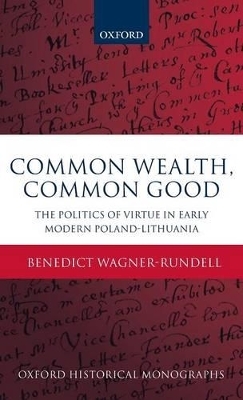
Common Wealth, Common Good
The Politics of Virtue in Early Modern Poland-Lithuania
Seiten
2015
Oxford University Press (Verlag)
978-0-19-873534-2 (ISBN)
Oxford University Press (Verlag)
978-0-19-873534-2 (ISBN)
Common Wealth, Common Good is a study of the political discourse of the Commonwealth of Poland-Lithuania in the late seventeenth and early eighteenth centuries, arguing that Polish-Lithuanian politicians saw their political system primarily in moral terms, setting them apart from the growing tradition of self-interested republican politics.
Common Wealth, Common Good is a study of the political discourse of the Commonwealth of Poland-Lithuania in the late seventeenth and early eighteenth centuries. It argues that the Polish-Lithuanian political tradition was preoccupied during this period with moral concepts, in particular that of public virtue, understood as the subordination of private interests to the common good. Polish-Lithuanian politicians and commentators analysed their politics primarily in moral terms, arguing that the Commonwealth existed for the promotion of virtue, and depended for its survival upon on the retention of virtue among rulers and citizens. They analysed the acute political dysfunction that the Commonwealth experienced from the late seventeenth century as the result of corruption in the body politic. Proposals for reform of the Commonwealth's government aimed at reversing this corruption and restoring virtuous government in the service of the common good.
Benedict Wagner-Rundell analyses the most important political treatises, including reform proposals, of the late seventeenth and early eighteenth century, to demonstrate how virtue was central to contemporaries' understanding of the Commonwealth and its situation. He also argues that a concern with promoting virtue drove the development of local government during this period, and animated efforts for reform of the Commonwealth at the Sejm (Parliament) of 1712-13, and during the General Confederation of Tarnogród of 1715-17, a mass uprising by the Polish-Lithuanian nobility against King Augustus II. Placing the subject in international context, Common Wealth, Common Good argues that the Polish-Lithuanian political tradition's continuing preoccupation with virtue set it apart from republican traditions elsewhere in early-modern Europe and North America, where thinkers were beginning to consider whether self-interest could be harnessed as a positive political force. The Polish-Lithuanian tradition's failure to match such developments elsewhere in Europe arguably demonstrates its backwardness: however, its emphasis on the need for political systems to be underpinned by shared values still has great relevance today.
Common Wealth, Common Good is a study of the political discourse of the Commonwealth of Poland-Lithuania in the late seventeenth and early eighteenth centuries. It argues that the Polish-Lithuanian political tradition was preoccupied during this period with moral concepts, in particular that of public virtue, understood as the subordination of private interests to the common good. Polish-Lithuanian politicians and commentators analysed their politics primarily in moral terms, arguing that the Commonwealth existed for the promotion of virtue, and depended for its survival upon on the retention of virtue among rulers and citizens. They analysed the acute political dysfunction that the Commonwealth experienced from the late seventeenth century as the result of corruption in the body politic. Proposals for reform of the Commonwealth's government aimed at reversing this corruption and restoring virtuous government in the service of the common good.
Benedict Wagner-Rundell analyses the most important political treatises, including reform proposals, of the late seventeenth and early eighteenth century, to demonstrate how virtue was central to contemporaries' understanding of the Commonwealth and its situation. He also argues that a concern with promoting virtue drove the development of local government during this period, and animated efforts for reform of the Commonwealth at the Sejm (Parliament) of 1712-13, and during the General Confederation of Tarnogród of 1715-17, a mass uprising by the Polish-Lithuanian nobility against King Augustus II. Placing the subject in international context, Common Wealth, Common Good argues that the Polish-Lithuanian political tradition's continuing preoccupation with virtue set it apart from republican traditions elsewhere in early-modern Europe and North America, where thinkers were beginning to consider whether self-interest could be harnessed as a positive political force. The Polish-Lithuanian tradition's failure to match such developments elsewhere in Europe arguably demonstrates its backwardness: however, its emphasis on the need for political systems to be underpinned by shared values still has great relevance today.
Benedict Wagner-Rundell received a D.Phil in Modern History from the University of Oxford in 2008, having previously studied at Magdalen College, Oxford, and at the Jagiellonian University of Kraków, Poland. Since completing his D.Phil, he has worked in public service, at HM Treasury and most recently as First Secretary at the British Embassy in Washington, DC.
Introduction ; 1. The Ideal of the Commonwealth ; 2. Calls for a Moral Revival ; 3. Government of Local Worthies ; 4. Proposals for Radical Reform ; 5. The Sejm of 1712-13 ; 6. The Confederation of Tarnogrod ; 7. A Reforming Moment? ; 8. Wider Contexts ; Conclusion ; Appendix A: Chronological Table of Key Events ; Appendix B: Note on Names and Glossary of Polish Terms ; Bibliography
| Erscheint lt. Verlag | 2.4.2015 |
|---|---|
| Reihe/Serie | Oxford Historical Monographs |
| Verlagsort | Oxford |
| Sprache | englisch |
| Maße | 148 x 222 mm |
| Gewicht | 378 g |
| Themenwelt | Geschichte ► Allgemeine Geschichte ► Neuzeit (bis 1918) |
| Geisteswissenschaften ► Geschichte ► Regional- / Ländergeschichte | |
| Geschichte ► Teilgebiete der Geschichte ► Kulturgeschichte | |
| Sozialwissenschaften ► Politik / Verwaltung ► Politische Systeme | |
| Sozialwissenschaften ► Politik / Verwaltung ► Politische Theorie | |
| ISBN-10 | 0-19-873534-0 / 0198735340 |
| ISBN-13 | 978-0-19-873534-2 / 9780198735342 |
| Zustand | Neuware |
| Haben Sie eine Frage zum Produkt? |
Mehr entdecken
aus dem Bereich
aus dem Bereich
Europa 1848/49 und der Kampf für eine neue Welt
Buch | Hardcover (2023)
DVA (Verlag)
CHF 67,20
Giordano Bruno - ein ketzerisches Leben
Buch | Hardcover (2024)
C.H.Beck (Verlag)
CHF 41,85


